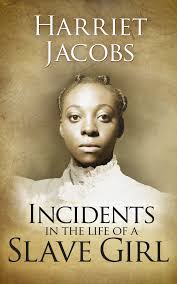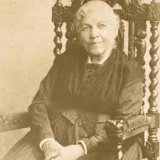Incidents in the Life of a Slave Girl Page #2
Incidents in the Life of a Slave Girl, written by herself is an autobiography by Harriet Jacobs, a mother and fugitive slave, published in 1861 by L. Maria Child, who edited the book for its author. Jacobs used the pseudonym Linda Brent.
To this good grandmother I was indebted for many comforts. My brother Willie and I often received portions of the crackers, cakes, and preserves, she made to sell; and after we ceased to be children we were indebted to her for many more important services. Such were the unusually fortunate circumstances of my early childhood. When I was six years old, my mother died; and then, for the first time, I learned, by the talk around me, that I was a slave. My mother's mistress was the daughter of my grandmother's mistress. She was the foster sister of my mother; they were both nourished at my grandmother's breast. In fact, my mother had been weaned at three months old, that the babe of the mistress might obtain sufficient food. They played together as children; and, when they became women, my mother was a most faithful servant to her whiter foster sister. On her death-bed her mistress promised that her children should never suffer for any thing; and during her lifetime she kept her word. They all spoke kindly of my dead mother, who had been a slave merely in name, but in nature was noble and womanly. I grieved for her, and my young mind was troubled with the thought who would now take care of me and my little brother. I was told that my home was now to be with her mistress; and I found it a happy one. No toilsome or disagreeable duties were imposed on me. My mistress was so kind to me that I was always glad to do her bidding, and proud to labor for her as much as my young years would permit. I would sit by her side for hours, sewing diligently, with a heart as free from care as that of any free-born white child. When she thought I was tired, she would send me out to run and jump; and away I bounded, to gather berries or flowers to decorate her room. Those were happy days--too happy to last. The slave child had no thought for the morrow; but there came that blight, which too surely waits on every human being born to be a chattel. When I was nearly twelve years old, my kind mistress sickened and died. As I saw the cheek grow paler, and the eye more glassy, how earnestly I prayed in my heart that she might live! I loved her; for she had been almost like a mother to me. My prayers were not answered. She died, and they buried her in the little churchyard, where, day after day, my tears fell upon her grave. I was sent to spend a week with my grandmother. I was now old enough to begin to think of the future; and again and again I asked myself what they would do with me. I felt sure I should never find another mistress so kind as the one who was gone. She had promised my dying mother that her children should never suffer for any thing; and when I remembered that, and recalled her many proofs of attachment to me, I could not help having some hopes that she had left me free. My friends were almost certain it would be so. They thought she would be sure to do it, on account of my mother's love and faithful service. But, alas! we all know that the memory of a faithful slave does not avail much to save her children from the auction block. After a brief period of suspense, the will of my mistress was read, and we learned that she had bequeathed me to her sister's daughter, a child of five years old. So vanished our hopes. My mistress had taught me the precepts of God's Word: "Thou shalt love thy neighbor as thyself." "Whatsoever ye would that men should do unto you, do ye even so unto them." But I was her slave, and I suppose she did not recognize me as her neighbor. I would give much to blot out from my memory that one great wrong. As a child, I loved my mistress; and, looking back on the happy days I spent with her, I try to think with less bitterness of this act of injustice. While I was with her, she taught me to read and spell; and for this privilege, which so rarely falls to the lot of a slave, I bless her memory.
Translation
Translate and read this book in other languages:
Select another language:
- - Select -
- 简体中文 (Chinese - Simplified)
- 繁體中文 (Chinese - Traditional)
- Español (Spanish)
- Esperanto (Esperanto)
- 日本語 (Japanese)
- Português (Portuguese)
- Deutsch (German)
- العربية (Arabic)
- Français (French)
- Русский (Russian)
- ಕನ್ನಡ (Kannada)
- 한국어 (Korean)
- עברית (Hebrew)
- Gaeilge (Irish)
- Українська (Ukrainian)
- اردو (Urdu)
- Magyar (Hungarian)
- मानक हिन्दी (Hindi)
- Indonesia (Indonesian)
- Italiano (Italian)
- தமிழ் (Tamil)
- Türkçe (Turkish)
- తెలుగు (Telugu)
- ภาษาไทย (Thai)
- Tiếng Việt (Vietnamese)
- Čeština (Czech)
- Polski (Polish)
- Bahasa Indonesia (Indonesian)
- Românește (Romanian)
- Nederlands (Dutch)
- Ελληνικά (Greek)
- Latinum (Latin)
- Svenska (Swedish)
- Dansk (Danish)
- Suomi (Finnish)
- فارسی (Persian)
- ייִדיש (Yiddish)
- հայերեն (Armenian)
- Norsk (Norwegian)
- English (English)
Citation
Use the citation below to add this book to your bibliography:
Style:MLAChicagoAPA
"Incidents in the Life of a Slave Girl Books." Literature.com. STANDS4 LLC, 2025. Web. 22 Feb. 2025. <https://www.literature.com/book/incidents_in_the_life_of_a_slave_girl_947>.








Discuss this Incidents in the Life of a Slave Girl book with the community:
Report Comment
We're doing our best to make sure our content is useful, accurate and safe.
If by any chance you spot an inappropriate comment while navigating through our website please use this form to let us know, and we'll take care of it shortly.
Attachment
You need to be logged in to favorite.
Log In